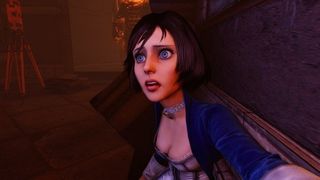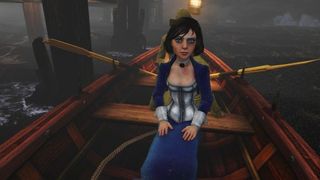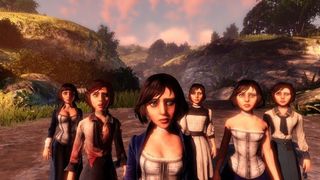
Spoiler Alert! Don't read this post or its comments unless you've finished BioShock Infinite. Experience it for yourself so you can come back and analyze it with us when you're done. Don't even scroll down a little. There are screenshots.
Those of you still reading can appreciate why we say that—the ending needs to be experienced fresh, but not talking about it is excruciating, even when your friends are cupping their ears. We've been going back and forth about Infinite for a few days, and that conversation comes in two flavors: the technical exercise of untangling all the interdimensional spaghetti, and our critical response to it.
The best way to express that conversation is with the conversation itself, so Evan and Tyler have written out their key points in the dialog below. Evan, you have the floor:
Evan: Let's talk this out, Tyler. I think it's fair to call Infinite's ending one of the most intricate ever. With multiple realities being a theme, mechanic, and plot device, there's a bunch of inherent complexity to the story. Part of the fun is unraveling the ball of quantum yarn Irrational throws at you, but more simply: did you like the ending, and how it was executed?
Tyler: I did! Well, mostly. I've been untangling it for a couple days, and that it can be untangled is pleasing. It gives me the same kind of pleasure I get from solving logic problems or riddles. Thematically, though, it's less appealing.
Evan: Yeah, I feel similarly. I feel like Infinite's appeal lies in its complexity more than the characters and the game's theme, which were the strengths of the original BioShock. But before we dig into more analysis, why don't we try and unpackage what happened?

Tyler: The Internet has already done some great detective work on this , with pretty graphs! Here's the gist: After surviving Wounded Knee, Booker DeWitt can either be baptized or not baptized. If he's baptized, he goes on to become Comstock and create Columbia. If he refuses, he becomes a degenerate drunk. They're two sides of the same coin.
PC Gamer Newsletter
Sign up to get the best content of the week, and great gaming deals, as picked by the editors.
Now here's the conflict: The Comstock version of Booker can't have kids, but he can travel between dimensions, so he invades the dimension where unbaptized Booker exists and buys his daughter Anna, who he renames to Elizabeth. Booker goes back to reclaim her, but is caught in a loop in which he always fails. The loop is broken at the end, we presume, when Anna becomes a Time Lord and Booker returns to the baptism and dies in place of the version of him who would become Comstock.
Or not, we can't be sure.
Evan: Bingo. It's not a coincidence that Booker and Elizabeth break into the song “Will The Circle Be Unbroken” near the middle of the game. That song represents one of the central questions Infinite is posing—is it possible to make a change, to be absolved, to reverse a bad decision... like selling your daughter to “wipe away the debt,” as Booker does. It's a pretty relatable theme—it's human to make mistakes, and it's human to fantasize about unmaking them.
http://youtu.be/yx8GowKaRpM?t=1m9s
Tyler: It's a redemption story without a redemption, which makes it more tragic. The hero is the villain, even after Comstock is erased, because Booker is the same drunk who would've sold his own daughter (unless he somehow remembers his Columbia adventure, but I'd expect a plot-device nosebleed to take the place of that.)
This theme of dichotomies and sameness runs through the whole game. I took the pivotal baptism to mean that we can't escape our past or wash it away. Whether or not he refuses, Booker is still a jackass. Even if we confront what we've done, it may still consume us.
Booker's death in that scene meant to me that we can't change the past, but we can try to change the future...and it really helps if we have a few interdimensional lighthouses. I don't mean to sound glib. I didn't take it as a positive message, which is welcome. But how did you feel about how we got there?
Evan: A tiny thing that bugged me was the way the twist got telegraphed before you come face to face with Comstock. During the big airship battle at the end he says something along the lines of “Well, you always had a penchant for self-destruction,” which was too much of a wink and a nudge for me. I knew right then that Comstock was Booker.
Tyler: I finished the game at about 4 a.m., so a lot of that foreshadowing bounced off my eyelids. Looking back, it was pretty heavy handed, but I liked that line. It was fun to go “Ooooohhhh” when things started clicking. Figuring out that the Luteces are the same person, and that the coin flip at the beginning represents the number of loops, was neat.
Evan: So, yeah, I think we agree that the technical exercise of mapping out the plot is enjoyable. It reminds me of piecing together the underlying logic of Inception or Lost with my friends. But did we like the ending? Awful boss battle aside, I liked the original BioShock's conclusion more. Hints are scattered throughout Infinite, but I didn't like how much exposition and explanation was crammed into the final few minutes.
Tyler: Yes, absolutely. There's this slow build during the first three-quarters of the game, where you know something is off, and then someone hits the fast-forward button and woosh , we're traveling through time and space explaining everything to wrap it all up

Evan: Yeah, I wasn't thrilled with that execution. It leaves you with questions that are fun to unwrap, but in the moment I felt slightly disappointed. Comstock is so central to the premise of the game, but he was weirdly underdeveloped, and that undermined the meaning of everything for me.
Comstock didn't pester you in the way that Andrew Ryan did. He wasn't as enigmatic or menacing. I didn't feel let inside his head. I didn't feel like I was being constantly watched. I'm not saying that they need to be perfect mirrors of one another in order to be good characters, but killing him felt like an eventuality, and Ryan's death in BioShock was a dramatic surprise. Infinite also gives you less time after that climax to walk around the world with that blood on your hands.
Related to that, and at the risk of sounding completely cold, I'm not sure how much I cared about Elizabeth at the end. I think the insane asylum level made me care less about her; I had a hard time accepting that her personality just shifted into being so misantropic. I didn't like how that level fed into her being a damsel in distress rather than the capable, human, gifted person.
Tyler: I disagree about the asylum. Elizabeth became helpless right as I was putting together that this had happened before—the message, to me, was that Booker is the helpless one.
But then, yeah, Comstock becomes a pawn—a willing victim who somehow underestimates Anna and the Luteces—and Anna becomes practically omnipotent, which I didn't like at all. She figures it all out so she can explain it to the player, but I'd have preferred to keep discovering the truth with her. It would have been great to see both Anna and Booker react to the revelation that Booker is her father. That would have been a character-driven scene, instead of a quantum physics-driven scene, which the entire ending is.
Evan: It makes me wonder what Infinite would've been like if it had fewer characters, or a mute protagonist. Anyway, what about that moment where you enter Rapture? It's fan servicey, but I LOOOOVED it. Maybe I just miss being in that world.
Tyler: From the perspective of a fan, I love that the Rapture cameo lets me build theories—like, say, that Andrew Ryan is Booker DeWitt. Comstock is much older than Booker, so we already know that time is irrelevant and BioShock taking place later than Infinite doesn't negate this theory.
But as we've established, that kind of speculative fun is only really fun after the fact, when I'm going back and forth with a friend like we are now.

Evan: We're friends? Aww.
Yeah, being thrown into Rapture filled me with this intense curiosity about how far they were going to take that scene, that visit. And I think I would've liked the ending more if that moment were more than an empty room.
Tyler: I can't deny that it made me a little giddy, but it reminded me I was playing a game, because all these different worlds and possibilities could have been interpreted to mean “all these different games and players.”
That's interesting—turning the camera around and pointing it at the medium—but it was winking so hard it squished my relationship with Booker and Anna (if her becoming a god hadn't already) and made it about my relationship with the game, the series, and Ken Levine. Not that I don't want to hug Ken Levine for making something so clearly meaningful to me.
But, there are technical issues, too. Some of the sound mixing was off—I couldn't hear half of what Ghost Mom was saying—and I can't be the only one who started playing a Voxophone only to have an important line of dialog interrupt it, and then the sound of munching corpse food interrupt that. I know I should have taken it slower, but standing still and listening is hard when there's so much to interact with.
Evan: Mmm, corpse food. But yeah, I think we're coming to a similar conclusion: Infinite's ending was cerebrally satisfying, and BioShock's was emotionally manipulative in the best way possible and more interesting on the merits of its characters.

Tyler: Totally. Both have merits, and that's a great point with which to conclude my critique of the execution. My biggest issue is that BioShock's emotional narrative can be decoded by playing it naturally—however that may be for each individual—whereas Infinite is a mess if you don't play it in a specific way. Listening to every Voxophone is essential if you want a fulfilling ending, and that's not communicated well. There are people reading this because the credits rolled and they looked at their screens and said, “Uh, what ?” I think that's something storytellers want to avoid.
Evan: Yeah, there's a ton of vital stuff that's dropped in the Voxophones. There's literally one called “The Source of Her Powers” from Lutece (“It would seem the universe does not like its peas mixed with its porridge”). Again, back to BioShock: I think it was clever for Irrational to give Rapture multiple mechanisms for the game to talk to the player: your radio, Rapture's PA system, and audio diaries.
Tyler: Even so, whether it takes one long playthrough, two playthroughs, or reading a thread on NeoGAF, Infinite is a fantastic logic puzzle to figure out. And when you do get the complete story, the themes are there, if a bit overshadowed by all the wibbly wobbly timey wimey.
We expect BioShock to make us think and to reconfigure tropes, and Infinite does that despite the mechanical approach to narrative that tends to happen when you deal with interdimensional time travel. That's very praise-worthy, and more than we've come to expect from games.
Evan: Yeah, shortcomings included, it'd be foolish not to celebrate an ambitious story like this. We need more of them. We need more big publishers to take creative risks and trust their designers to have big, insane dreams that are worthy of deconstructing and writing 2,000-word responses to.
Hey folks, beloved mascot Coconut Monkey here representing the collective PC Gamer editorial team, who worked together to write this article! PC Gamer is the global authority on PC games—starting in 1993 with the magazine, and then in 2010 with this website you're currently reading. We have writers across the US, UK and Australia, who you can read about here.
Most Popular







